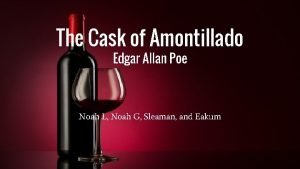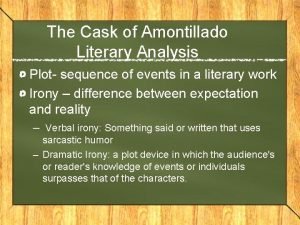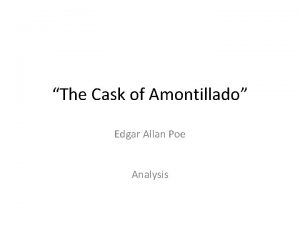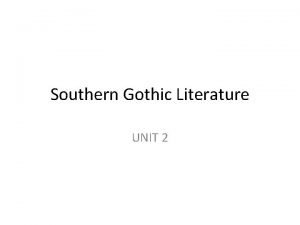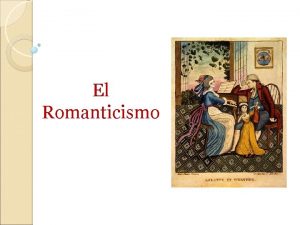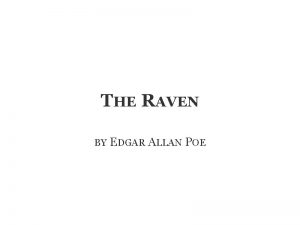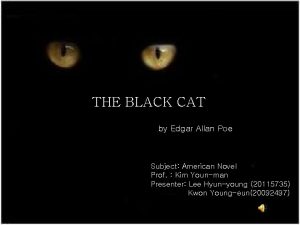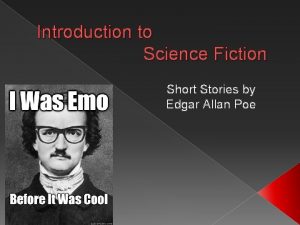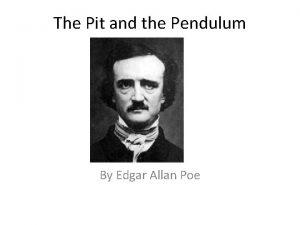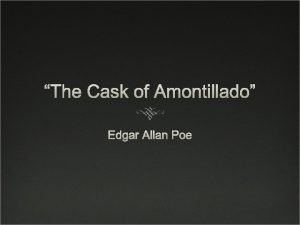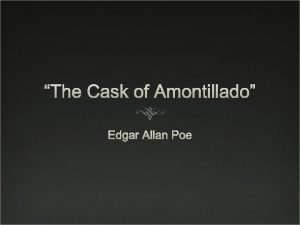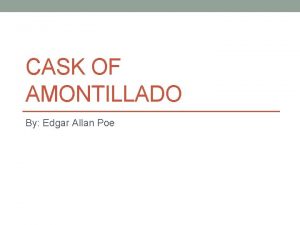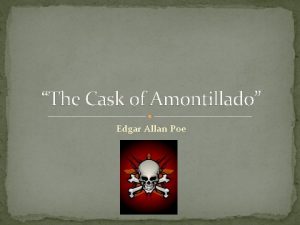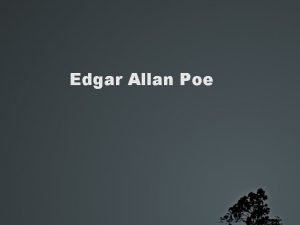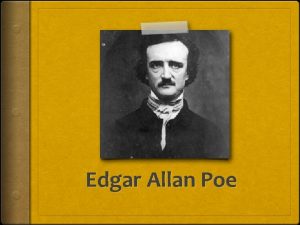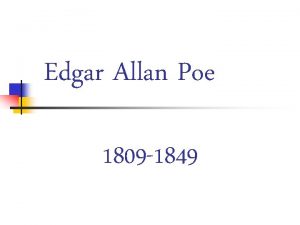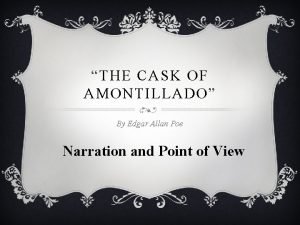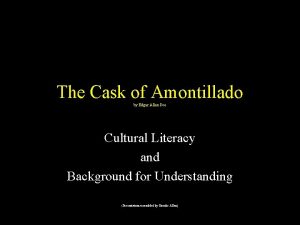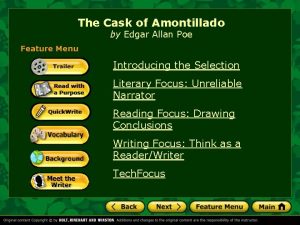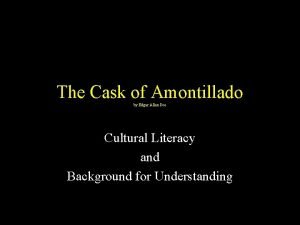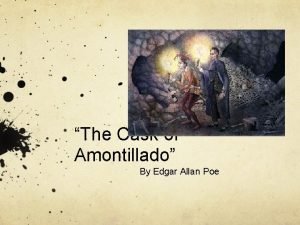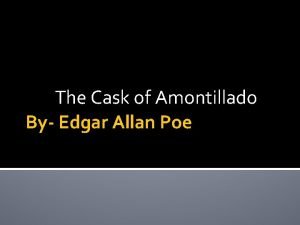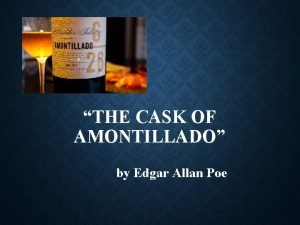The Cask of Amontillado Edgar Allan Poe Noah
















![Themes Ego (continued): Montresor knew he had “a weak point […] he prided himself Themes Ego (continued): Montresor knew he had “a weak point […] he prided himself](https://slidetodoc.com/presentation_image/38be5b1d08d87d89e68abc66f7fcd03e/image-17.jpg)


- Slides: 19

The Cask of Amontillado Edgar Allan Poe Noah L, Noah G, Sleaman, and Eakum

In This Presentation, We Will Cover: A brief plot summary (Noah G) Use of literary devices (Noah L) Analysis of conflict (Sleaman) Analysis of theme (Eakum) Analysis of the different aspects of the story (All)

Have you Ever Wanted Vengeance on Anyone?

Summary of the Plot 2 main characters: the narrator and his nemesis (Fortunato) Fortunato did something to the narrator before the story starts, and the opening chapter talks about how the narrator vows vengeance The next paragraph explains how Fortunato had no reason to suspect him, so it was a perfect opportunity Fortunato does not want Luchresi to obtain the wine speaking about he does not appreciate the wine by saying “Luchresi, he cannot distinguish Sherry from Amontillado Fortunato shows up at the narrator’s house, expecting to buy some rare and expensive wine called “Amontillado”

Summary of the Plot: (Continued) ● The narrator leads him down into the catacombs under his wine cellar, telling Fortunato that the wine is down below. ● As the narrator leads him to a dead end, he chains Fortunato to the wall in a small recess. The narrator starts to build a wall to trap Fortunato is screaming at the narrator at this point to get him to stop. After most of the building is done, the narrator thinks and somewhat regrets what he had done to Fortunato. However, it is too for the narrator to go back, and he finishes his masonry and leaves it.

Literary Terms Imagery: “A succession of loud and shrill screams, bursting steadily from the chained form” (Poe 113). ● It is meant to create an image within the reader's mind of the distress Fortunato is going through ● This causes the reader to visualize themselves in the same situation constantly hearing the “loud and shrill screams” (Poe 113). ● This tends to creating a more realistic feeling throughout the short story

Literary Terms Dramatic Irony: The name Fortunato ● Fortunato = Fortune; often to referring to good luck ○ Throughout the entire story it shows how his name is not representing his future ● Fortunate to be able to obtain Amontillado ○ However the Amontillado seems to be anything but good ironically resulting in his demise ● The Author used this to make the story more interesting causing the reader to think and understand the short story more

Literary terms Mood: The mood of the short story The Cask of Amontillado seems to progressively become darker following the setting ● The Carnival: ○ Bright from the games, “Supreme Madness” (Poe 109), Entertaining, Fun ● The Narrator’s Residence: ○ Empty; “no attendants at home” (Poe 110) ● The Catacombs: ○ “Damp ground of the catacombs”, Dark only lit by the “ two flambeaux”, “white web-work which gleams from [the] cavern walls” (Poe 110)

Conflict: Person vs. Person ● During the first part of the story montesoro (also known as the narrator) tries to take revenge on a person by the name of Fortunato who seems to be his enemy of a recent incident. “ The thousand injuries of Fortunato I had borne as I best could, but when he ventured upon insult I vowed revenge (poe 108)”

Continuation ● Montesoro kept making Fortunato feel drunk and made him keep drinking medoc wine so that Fortunato will feel drunk and be out of his senses and would make Montesoro’s job to chain up Fortunato to his death much easier. “ A drought of this Medoc will defend us from the damps. (poe 110)” “ It is nothing. ” he said; “Let us go on. But first, another draught of the Medoc. (Poe 111)”

Continuation At the end Montresor tells Fortunato to enter a pitch wall Fortunato is drunk and unconscious and as soon as Fortunato enters the pitched area Montesoro quickly chains up Fortunato as fasts as he can. “throwing the links about his waist, it was but the work of a few seconds to secure it. He was too much astounded to resist” (Poe 112).

Conflict: Person vs. Self Montesoro promised himself that he would take revenge on Fortunato “Ten thousand injuries of Fortunato I had borne as I best could, but when he ventured upon insult I vowed revenge” (Poe 108).

Continuation Montesoro expected Fortunato to expect revenge from himself. “It must be understood that neither by word nor deed had I given Fortunato cause to doubt my good will” (Poe 108).

Continuation Montresor gave himself the perfect opportunity to capture Fortunato by telling his servants that he would not return till morning, but Montesoro knew that as soon as he left his house his servants would leave his house. Which made Montesoro’s job easy to kill Fortunato. “I had told them that I should not return until the morning, and had given them explicit orders not to stir from the house. These orders were sufficient, I well knew, to insure their immediate disappearance, one and all as soon as my back was turned. ” (Poe 110).

Themes ● Revenge: ○ “The thousand injuries of Fortunato I had borne as I best could, but when he ventured upon insult I vowed revenge (poe 108)” ○ Montresor is motivated by revenge as the only means of justice to punish Fortunato for his insult(s). ○ Fortunato’s initial insult is not revealed to the reader.

Themes ● Ego: (a person's sense of self-importance or pride. ) ○ His desire to punish Fortunato is related to his family motto: “Nemo me impune lacessit”(Poe 111), which means “No one attacks with impunity” (without being punished). ○ His pride in his family name is so great that he cannot let himself be put down because he would appear to be weak and inferior.
![Themes Ego continued Montresor knew he had a weak point he prided himself Themes Ego (continued): Montresor knew he had “a weak point […] he prided himself](https://slidetodoc.com/presentation_image/38be5b1d08d87d89e68abc66f7fcd03e/image-17.jpg)
Themes Ego (continued): Montresor knew he had “a weak point […] he prided himself on his connoisseurship in wine” (Poe 108). Fortunato’s pride cannot accept that anyone is better at wine tasting than he is, so he insults both Montresor and Luchesi by saying, “You have been imposed upon; and as for Luchesi, he cannot distinguish Sherry from Amontillado” (Poe 109).

Additional Information Character: Montresor = My treasure Only wealth he has is his family name and reputation. “The Montresors [. . . ] were a great and numerous family” (Poe 111). Killed Fortunato to protect the only wealth he had, or his family name from being tarnished.

End Thank you for your patience
 The cask of amontillado by edgar allan poe theme
The cask of amontillado by edgar allan poe theme The cask of amontillado literary analysis questions answers
The cask of amontillado literary analysis questions answers The cask of amontillado literary analysis
The cask of amontillado literary analysis The cask of amontillado character
The cask of amontillado character Edgar allan poe biological parents
Edgar allan poe biological parents Alone edgar allan poe
Alone edgar allan poe Poetas satanicos
Poetas satanicos Summary of raven by edgar allan poe
Summary of raven by edgar allan poe Edgar allan poe vocabulary
Edgar allan poe vocabulary Cuando fallecio edgar allan poe
Cuando fallecio edgar allan poe Edgar allan poe the black cat summary
Edgar allan poe the black cat summary The lunchroom murder
The lunchroom murder Edgar allan poe vocabulary
Edgar allan poe vocabulary Edgar allan poe powerpoint template
Edgar allan poe powerpoint template Edgar allan poe richard parker
Edgar allan poe richard parker Edgar allan poe literary genre
Edgar allan poe literary genre The raven sparknotes
The raven sparknotes The raven edgar allan poe summary
The raven edgar allan poe summary When was poe born
When was poe born Edgar allan poe spanish inquisition
Edgar allan poe spanish inquisition
